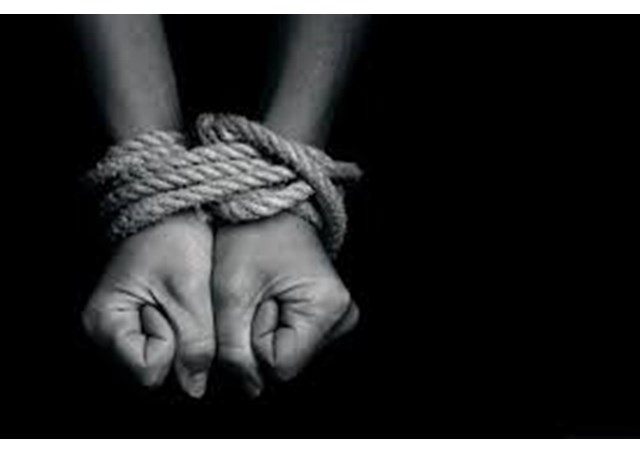
Holy See appeals for tough measures against human traffickers

(Vatican Radio) The Holy See is urging all States that are members of the Organization for Security and Co-operation in Europe to recognize human trafficking as one of the most heinous crimes and do all they can to eradicate it.
The appeal was made by Monsignor Janusz Urganczyk, Permanent Vatican Observer to the OSCE Permanent Council on Thursday during a meeting.
He emphasized that “particular attention should be given to the eradication of this crime when it is committed against children, who are enslaved and fall prey to exploitation as child labourers or soldiers, fall into the criminal network of drug trafficking or into the mire of pornography; who are forced to flee from conflict and persecution, risking isolation and abandonment”.
Monsignor Urganczyk also highlighted the fact that this bleak scenario is made even worse by the demand “even in the OSCE region which drives their exploitation and abuse”.
Thus, he said: “the only way to stop the multiple forms of child slavery effectively is to take more rigorous and effective actions against those who profit from such abuse”.
Please find below the full text of Monsignor Urbanczyk’s statement:
Mr Chairman,
The Delegation of the Holy See gladly joins previous speakers in warmly welcoming
the Special Representative and Co-ordinator for Combating Trafficking in Human Beings,
H. E. Ambassador Madina Jarbussynova, back to the Permanent Council and thanks her
for the presentation of her detailed report on the activities and priorities of her
Office. The Holy See has often spoken out against the evil of human trafficking, forced
labour and all forms of modern slavery, often focusing on abhorrent exploitation of
children. It has also tirelessly taken action, through the Catholic Church’s institutions
around the world, to put an end once and forever to this “social cancer”, which is
one of the greatest scourges and challenges of our time, as successive Popes have
often emphasized.
In fact, inspired by Church teaching, especially since the Second Vatican Council, as formulated by Popes John Paul II, Benedict XVI and Francis, many Catholic religious institutes, parishes, charitable organizations and groups of lay people in various parts of the world, are committed daily to the fight against trafficking, through prevention and care for victims. In opposing the crime network, they have established an effective solidarity network, constantly in contact, also through social media, which allows for the rapid exchange of information and programs. They also cooperate with Governments and local authorities in order to encourage them in their political decisions. Like his predecessors Pope Francis has condemned this enormous and hidden problem, and has also taken concrete action. In 2014 he spearheaded the Joint Declaration of Religious Leaders against Modern Slavery, and oversaw the creation of the so-called “Santa Marta Group”, named after his own residence in the Vatican. This is an alliance of responsibility between police forces and Church leaders all over the world, which aims, together with civil society, to eradicate human trafficking by developing strategies of prevention and reintegration of victims, as well as ensuring their pastoral care. Thanks to the Group’s work, including the close cooperation between the Church and the police, many desperate and silent voices have been heard. Thus, as Pope Francis said, “what is needed is a concerted, effective and dedicated effort, both to eliminate the causes of this complex phenomenon, and to encounter, assist and accompany the people who fall into the snare of trafficking”, who are “the most defenseless, who are robbed of their dignity, their physical and psychological integrity, even their lives”1. With the recent approval of the 2030 Agenda and SDGs, in particular goal 8.7, States who are members of the UN have reaffirmed their moral imperative to fight this massive violation of fundamental human rights.
In line with this, the Holy See urges all participating States, to recognize trafficking
in human beings as one of the most heinous crimes and continue to acknowledge their
moral duty to address it properly and indeed eradicate it. Particular attention should
be given to the eradication of this crime when it is committed against children, who
are enslaved and fall prey to exploitation as child labourers or soldiers, fall into
the criminal network of drug trafficking or into the mire of pornography; who are
forced to flee from conflict and persecution, risking isolation and abandonment. This
already bleak scenario is made worse by the demand even in the OSCE region which drives
their exploitation and abuse. Thus, the only way to stop the multiple forms of child
slavery effectively is to take more rigorous and effective actions against those who
profit from such abuse. Finally, I wish to conclude my remarks by recognizing the
conviction and admirable energy that Ambassador Jarbussynova has brought to her work.
I can only express my Delegation’s sincere gratitude to her and wish her all the best
as she continues to carry out the activities of her Office.
| All the contents on this site are copyrighted ©. |


